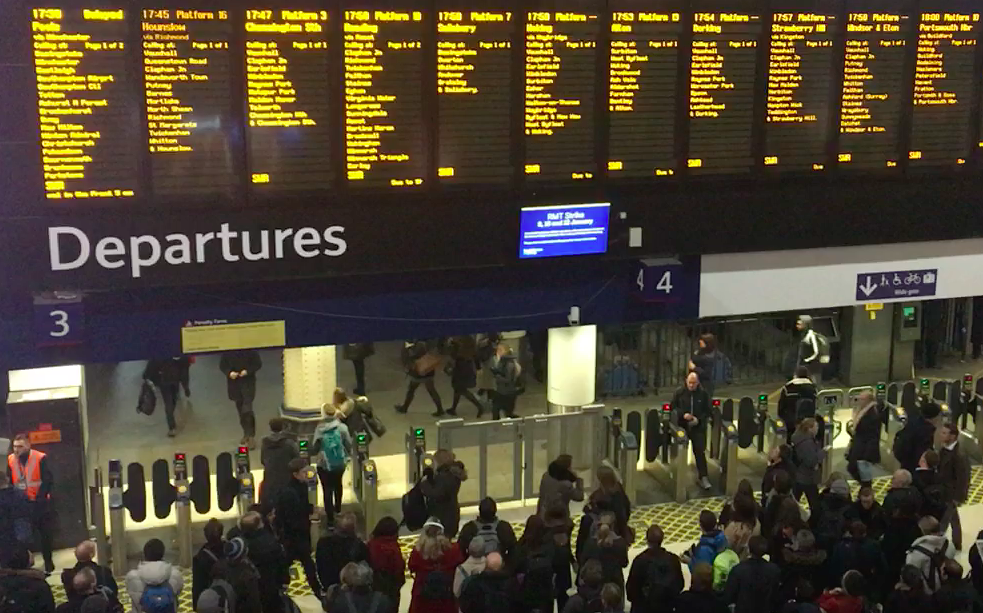'Lock them all in a room': commuter’s advice on how to end the bitter series of rail strikes
As RMT members stop work on five big train operators, the union demands meeting with new transport secretary – then finds Chris Grayling still has the job

Your support helps us to tell the story
From reproductive rights to climate change to Big Tech, The Independent is on the ground when the story is developing. Whether it's investigating the financials of Elon Musk's pro-Trump PAC or producing our latest documentary, 'The A Word', which shines a light on the American women fighting for reproductive rights, we know how important it is to parse out the facts from the messaging.
At such a critical moment in US history, we need reporters on the ground. Your donation allows us to keep sending journalists to speak to both sides of the story.
The Independent is trusted by Americans across the entire political spectrum. And unlike many other quality news outlets, we choose not to lock Americans out of our reporting and analysis with paywalls. We believe quality journalism should be available to everyone, paid for by those who can afford it.
Your support makes all the difference.After staring hopefully at the departure boards at London Waterloo for 40 minutes, rush-hour commuter Louise Lenarduzzi recommended a plan to end the bitter series of rail strikes: “Lock them all in a room and hopefully they can come to a solution as quickly as possible.”
Members of the RMT union working for South Western Railway, Northern, Merseyrail and Greater Anglia are striking on Monday, Wednesday and Friday this week over the role of guards. In addition, staff working for Southern – where the dispute began – took action on Monday.
South Western Railway, which runs to and from Britain’s busiest station, London Waterloo, told commuters: “We will once again be utilising the goodwill of our team of contingency guards to keep you moving and expect to run over 70 per cent of our normal Monday to Friday service.
Northern was aiming to run over 60 per cent of its trains, but only between 7am and 7pm. Merseyrail operated during the same time window, though it said: “There will be no trains running on the Kirkby, Ellesmere Port or Hunts Cross lines during the strike action.”
“By running longer trains we will provide an even higher percentage of seats. The majority of routes will see a reduced service, with buses replacing trains on a small number of routes.”
Greater Anglia said it was operating all of its services.
The RMT says the dispute over driver-only operation of doors “from day one has been about the guarantee of the second safety critical person on the train for safety, security and accessibility reasons”.
But the rail industry insists that trains on which drivers control the doors have been carrying passengers safely for three decades.
The chaotic Government reshuffle infiltrated the bitter, long-running rail dispute. The Conservatives’ official Twitter account announced at 11.43am that transport secretary Chris Grayling would become party chairman.
The RMT then issued an immediate press release calling for an “urgent meeting” with the new transport secretary, saying the replacement of Mr Grayling “opens up an opportunity for a new approach”.
In the release Mick Cash, the general secretary, said: “RMT is ready to brief the new transport secretary on the deals that we have struck in Scotland and Wales that secure the guarantee of a guard and which underpin the principles of passenger safety, security and access on our trains.
“With the action on this week this is the most pressing issue facing Chris Grayling’s replacement and there should be no delay in getting talks moving.”
However, the Conservatives’ Tweet announcing Mr Grayling’s appointment as party chairman was subsequently deleted.
While the transport secretary stayed put, so did tens of thousands of commuters as hundreds of trains were cancelled.
As Ms Lenarduzzi looked in vain for a way home, she said wearily: “Always, commuters are the people who pay for it.”
Join our commenting forum
Join thought-provoking conversations, follow other Independent readers and see their replies
Comments